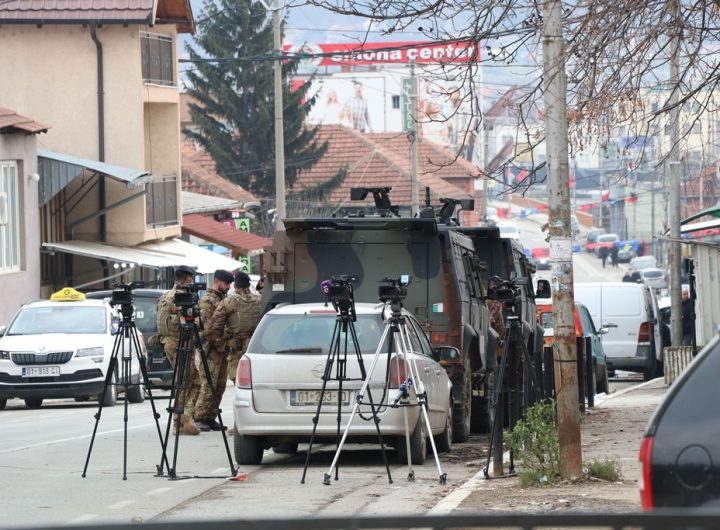
For the last ten and a half years, a part of the public has been struggling to answer the question – what is the basis of the Serbian Progressive Party’s seemingly untouchable strength? Among several working hypotheses, one of the most frequently used is that the basis of Aleksandar Vučić’s rule is the fear of the citizens.
One of those who share that opinion is the president of the Social Democratic Party and the former president of Serbia, Boris Tadić. As he recently pointed out in an interview with Danas, the SNS systematically blackmailed and intimidated citizens.
By supporting the SNS, citizens were first impoverished and then existentially blackmailed. In such a situation, the regime is counting on unconditional support and on the people to choose, above all, to exist, which they have assured us is dependent on the SNS remaining in power. It is therefore up to the opposition to dispel these illusions and free the citizens from fear. This regime relies on fear more than anything else. The end of this government will come when fear disappears, Tadić said.
Asked to comment on this assessment, Danas’s interlocutors are divided.
Slavica Radovanovic, a retired MUP member and MP on the People’s Party list, tends to agree with Tadic’s claim.
There is no doubt that a large part of the citizens are in fear and that this feeling is generated by the highest representatives of power. A good part of the citizens are in a sense blackmailed and are afraid that they or someone close to them will lose their job. In parallel with the establishment of this system, the government is constantly producing tension through the media, scaring people with sanctions, the departure of private companies, imaginary assassinations… It is not possible to live normally with the amount of fear that is being produced. That is why I absolutely agree that eliminating this fear will lead to a change of government, Radovanović stresses.
Her Assembly colleague, Aleksandar Olenik, a member of the Together for Vojvodina” Zajedno za Vojvodinu – Vojvođani” coalition, agrees that fear is part of the equation, but does not link its exploitation exclusively to the current government.
Fear is present, but it did not arise of its own accord, so it is naive to believe that it will disappear. Fear is one of the ways in which nationalists govern, and it was used by Tadić himself. In the elections, he did not promote European and civil politics, but frightened the citizens with the arrival of radicals in power. Thus, they did not vote for European values, they voted against the radicals. This largely destroyed the civil parties and grew fear, says Olenik.
Sociologist Dario Hajrić, on the other hand, believes that power is based on something much more tangible.
It is naive to imagine that this government is based on the emotional state of its citizens. It is based on the usurpation of institutions and the media space, the unlimited and unrestricted use of budget money, and giving the whole class of citizens the opportunity to participate in corruption under the auspices of the SNS. Citizens are not “scared” – they are literally prevented from changing the government, either through institutions or without them, Hajrić points out.
In addition to the statement that fear is individual, lawyer Milan Antonijević points out that the people have somewhat forgotten that even in the Dušan’s Code there was a command that judges should judge according to the Code, not “in fear of the empire”. Tadić himself, he adds, did not remember this sentence when he was on that “imperial” throne.
Fear is individual, and today it is also fed by such stories that the individual is powerless, that he is in fear. With isolated examples of what happens to the brave who stand up to a ruler’s arbitrary rule, the perfect stage is set for ruling with a firm hand. I would much rather believe such words that even during Tadić’s presidency, there was governance, for a country without fear, for judges without fear, for power-sharing, for a media free from the pressure of the first version of Nebojša Krstić, Antonijević points out.
He adds that he believes much more in leading every state institution “by example”.
Today, I am interested in how to create strong institutions, how to restore faith in the rule of law, in human rights and how to empower the individual economically and in every way, and fear, if it exists, will disappear by itself during that new “renaissance”, Antonijevic stresses./Danas/

 October Group: Aleksandar Vučić to unconditionally and immediately release Kosovo police officers
October Group: Aleksandar Vučić to unconditionally and immediately release Kosovo police officers  Reporting on Serbian Leader’s Links to Criminal Groups Raises Questions for US
Reporting on Serbian Leader’s Links to Criminal Groups Raises Questions for US  The murderer of Oliver Ivanovic is hiding in Sky messages of the Kavac clan: The indictment reveals the details of communication between a Montenegrin policeman and members of the MUP Serbia
The murderer of Oliver Ivanovic is hiding in Sky messages of the Kavac clan: The indictment reveals the details of communication between a Montenegrin policeman and members of the MUP Serbia  China expresses support for Serbia in renewed Kosovo clashes involving NATO troops
China expresses support for Serbia in renewed Kosovo clashes involving NATO troops  With 15 announcements in two days, AJK reports on attacks on journalist teams in the North
With 15 announcements in two days, AJK reports on attacks on journalist teams in the North  Murphy: Serbia should stand by US and EU, not Russia
Murphy: Serbia should stand by US and EU, not Russia